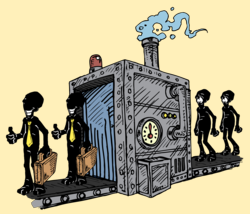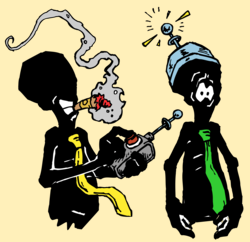 On this day 1939 years ago, the Roman forces led by Titus seized control of Jerusalem after a siege lasting several months. The temple and the city were subsequently destroyed after the Roman soldiers set fire to an apartment next to the Temple. According to the historian Josephus, more than 1 million people were killed and 97,000 were enslaved. This fulfilled the prediction of Jesus made some 40 years previously:
On this day 1939 years ago, the Roman forces led by Titus seized control of Jerusalem after a siege lasting several months. The temple and the city were subsequently destroyed after the Roman soldiers set fire to an apartment next to the Temple. According to the historian Josephus, more than 1 million people were killed and 97,000 were enslaved. This fulfilled the prediction of Jesus made some 40 years previously:
41As he approached Jerusalem and saw the city, he wept over it 42and said, “If you, even you, had only known on this day what would bring you peace—but now it is hidden from your eyes. 43The days will come upon you when your enemies will build an embankment against you and encircle you and hem you in on every side. 44They will dash you to the ground, you and the children within your walls. They will not leave one stone on another, because you did not recognize the time of God’s coming to you.”
Titus was the son of Vespasian who had become the Roman Emperor in 69AD, and Titus was appointed commander of the Praetorian Guard. Vespasian died in 79AD and Titus succeeded him as Emperor. Titus became a popular and effective emperor, abolishing the network of informers who had terrorised Rome’s political system, and completing the construction of the Colosseum. He died of a fever at the age of 41, after reigning for just two years, and he was succeeded as emperor by his brother Domitian.
 If someone comes up with new ideas and starts making claims about a new philosophy, how do you assess whether those claims are true? History shows that there are three major ways of dealing with this sort of situation: 1. Accept the claims; 2. Resist the claims and try to repress them; or 3. Ignore the claims and see what happens. The option of resisting and repressing has its advantages, but the result can be counterproductive. The people who subscribe to the claims can see themselves as martyrs, and the persecution which they suffer can elicit sympathy from others which supports their cause. So the best approach to take is often the wait-and-see approach.
If someone comes up with new ideas and starts making claims about a new philosophy, how do you assess whether those claims are true? History shows that there are three major ways of dealing with this sort of situation: 1. Accept the claims; 2. Resist the claims and try to repress them; or 3. Ignore the claims and see what happens. The option of resisting and repressing has its advantages, but the result can be counterproductive. The people who subscribe to the claims can see themselves as martyrs, and the persecution which they suffer can elicit sympathy from others which supports their cause. So the best approach to take is often the wait-and-see approach. Many different perspectives of Africa are captured in Richard Dowden’s remarkable book
Many different perspectives of Africa are captured in Richard Dowden’s remarkable book  This post continues the weekly series discussing themes from Gregory Clark’s book
This post continues the weekly series discussing themes from Gregory Clark’s book  President Kibaki has
President Kibaki has  According to
According to